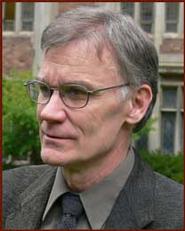
February 22 was the 150th anniversary of Jefferson Davis's announcement of the Confederate cabinet and Abraham Lincoln's enunciation of his goals for America at a speech in Philadelphia. It was also the date on which Yale University Professor David Blight visited Hamilton to present a retrospective on American views of the Civil War. By examining a pair of 20th century authors who wrote on the topic, Blight illustrated long-term trends on the way Americans think about the Civil War and the nation.
Blight began by discussing Fredrick Douglass's views of the South's secession. This served to outline the larger 1861-era thoughts on war; while leaders of both the Confederacy and the United States were outwardly opposed to war (or at least firing the first shot,) Douglass reveled in the opportunity. Blight quoted Douglass, who said “[The Confederates] have chosen to be a big part of nothing instead of a small part of everything.” At this point, Blight noted the enduring nature of the Civil War. He cited King's “I Have A Dream” speech as the most important speech commemorating the centennial of the Civil War, observing that King echoed Lincoln. Both the Civil War and Civil Rights movement served as a “re-founding” of the nation.
Two scholars served as the focus of Blight's discussion. Robert Penn Warren was born in early 20th century Kentucky and learned of the Civil War from his grandfather, a Confederate veteran. Warren also listened to civil war stories and poetry; as Blight put it, Warren was “soaked in the Civil War.” Warren went on to write numerous books about the Civil War. James Baldwin was born in Harlem during the Roaring ’20s to a deeply impoverished family. A “prodigy writer,” Baldwin was too poor to attend college and after graduating from high school moved to Greenwich Village, where he had a troubled youth. He ultimately left America for over a decade, returning in 1957 when the Civil Rights movement was picking up.
Baldwin went on to become a major figure in the Civil Rights movement, writing a bestselling book in 1963 and becoming an essayist and speaker for the Civil Rights movement. When speaking, Blight noted that Baldwin “made himself the subject,” and observed that Baldwin “believed he embodied the legacy of the Civil War in his own experience.” Warren ended up meeting Baldwin when conducting interviews with members of the Civil Rights movement, and the two developed a lasting connection.
Blight established a handful of themes from the lives of Warren and Baldwin. He first noted that many accounts of the Civil War glorified the conflict, observing that conventional wisdom is that “the Civil War made America greater.” Blight also observed that Americans love redemptive stories and stated that writing and learning about history can “redeem mistakes of the past.” He finally discussed the role of tragedy in history.
Pointing out that while tragedy can be an obvious element of life, he noted that it can nevertheless result in a gain of knowledge. Blight asserted that not enough Americans view the Civil War as a tragedy, and that understanding the Civil War as a tragedy will give a fuller understanding of its role in history.
